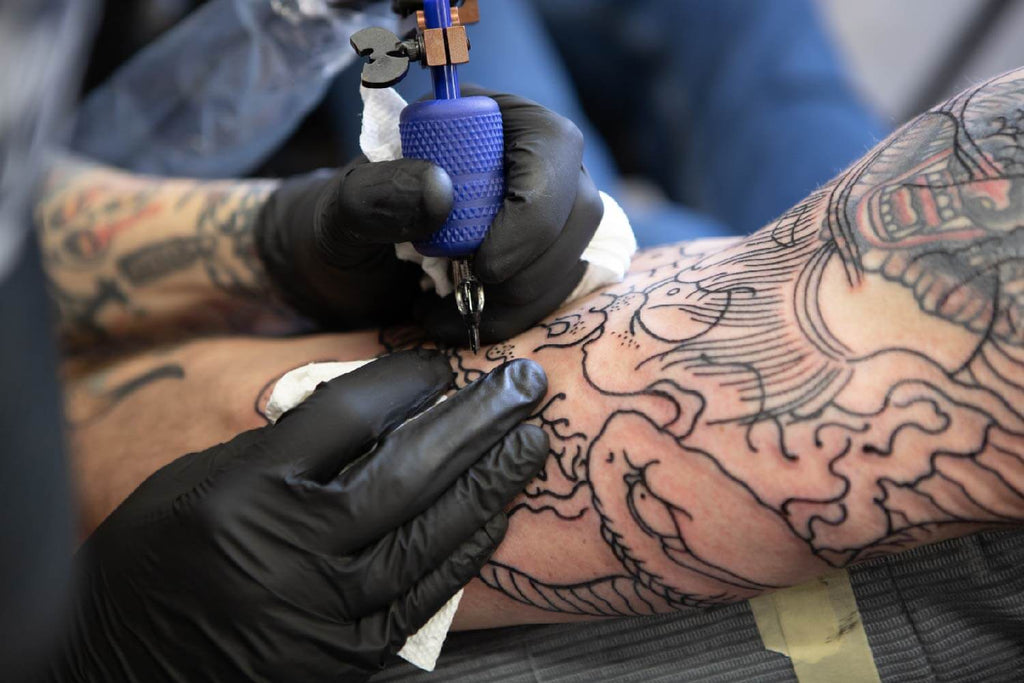Tattoos can be a painful experience, but with numbing creams, they don’t have to be. However, you may be wondering if these creams are too good to be true. Do they truly eliminate pain? And more importantly, do they affect the quality of your tattoo or the healing process? If you’re considering using numbing cream for your next tattoo, this article will provide some clarity.
Table of Contents
ToggleDoes Numbing Cream Affect Tattoos?
When applied properly, tattoo numbing creams do not have any negative effects on your skin or the tattooing process. These creams are 100% safe and effective in numbing large or sensitive areas. Acting as local anesthetics, they numb the area for 4-6 hours, allowing you to sit comfortably during your tattoo session. Once your tattoo is complete, you can simply wipe away the excess cream and begin the healing process without worrying about infections or fading.
Despite the pain-reducing benefits, some individuals choose not to use numbing creams. There’s a common argument that “pain is part of the process” and using numbing creams shows weakness. However, if you’re someone with a low pain tolerance and a strong passion for tattoos, numbing creams offer a pain-free solution. Don’t let the opinions of others hold you back from expressing yourself.
Should You Use Tattoo Numbing Cream?
Ultimately, the choice to use tattoo numbing cream is up to you. Consider the following factors:
Size & Location of the Tattoo
Numbing creams are most effective for tattoos on sensitive parts of the body, such as the ribs, ankles, and neck. They are also great for reducing pain during larger designs like chest and back pieces, half sleeves, and full sleeves. If you’re getting a small tattoo that may only take an hour or so, you may not necessarily need a numbing cream. However, it’s worth noting that the numbness may last for several hours even after your small tattoo is complete.
Pain Tolerance
If you have a low pain tolerance, you may have previously written off the idea of getting a tattoo. However, with numbing creams, you can reconsider. These creams reduce pain to practically nothing, allowing you to finally get the tattoo you’ve been dreaming of. Even if you have a high pain threshold but would rather avoid the scratching and stinging sensation, numbing creams work just as well, keeping you comfortable throughout the entire tattoo session.
Sensitive Skin
If you have sensitive skin, you likely have to be cautious about the products you use. Some lotions, makeup, and soaps can cause irritation. It’s important to consult with your dermatologist before getting a tattoo. They can provide guidance and may even prescribe a pharmaceutical-grade numbing cream specifically tailored to your skin type.
Which Type of Numbing Cream Should You Use?
There are three types of numbing creams: nerve deadeners, nerve blockers, and vasoconstrictors. Each type uses different combinations of ingredients to achieve a numbing effect.
Nerve deadeners: These creams use lidocaine as the active ingredient. Lidocaine temporarily “deadens” the nerves in your skin, preventing the brain from registering pain. TKTX Numbing Creams, like our Signature and Signature+ Numbing Creams, are nerve deadeners made with lidocaine, glycerin, butylene glycol, and water. They are considered a safe and effective choice among tattoo enthusiasts.
Nerve blockers: These creams contain benzocaine and tetracaine as the active ingredients. These components block the pain signals from reaching your brain. While you may still feel some discomfort, it will be a dull sensation rather than sharp, stinging pain.
Vasoconstrictors: These creams utilize epinephrine as the active ingredient. Epinephrine constricts blood flow, reducing bleeding and swelling. However, vasoconstrictors are considered the most dangerous type of numbing cream.
When shopping for a topical cream, do your research and choose a highly-reviewed and trusted brand. Don’t simply opt for the cheapest option available.
Will Your Tattoo Artist Allow Numbing Cream?
Most tattoo artists are open to the use of numbing cream, and some may even encourage it. When you’re comfortable during the tattoo session, it allows the artist to work without distractions and constant breaks. However, there are exceptions. Some artists may not work with numbing creams they haven’t tried before. In such cases, you may need to find a different artist or prepare yourself to endure the pain.
Is It Okay to Use Numbing Cream Before a Tattoo?
Absolutely! You can safely use numbing cream for your next tattoo without worrying about it affecting your new ink. Consult with your artist and dermatologist to ensure you follow the correct application process. Apply the cream at least 60-90 minutes before your tattoo session. Rest assured, it won’t affect the color, design, or the healing process of your tattoo. Remember, choose the best numbing cream for your skin type!
Frequently Asked Questions
Below are some frequently asked questions about using numbing cream:
Are numbing creams safe to use? Yes, when used properly, numbing creams are safe. Follow the instructions provided and consult with a healthcare professional if you have any concerns.
How long does the numbing effect last? The numbing effect typically lasts for 4-6 hours, allowing you to comfortably endure the tattoo session.
Can I use numbing cream for other procedures, such as piercings? Numbing creams can be used for various procedures, including piercings. However, it’s important to consult with a professional to ensure proper application and safety.
Are there any side effects of using numbing cream? While rare, some individuals may experience allergic reactions or skin irritation. It’s essential to perform a patch test prior to using numbing cream.
Conclusion
Numbing creams can significantly reduce the pain associated with getting a tattoo, making the experience more comfortable for individuals with low pain tolerance or sensitive areas. When used correctly, numbing creams do not negatively affect the tattooing process or the healing of your new ink. Choose a reputable brand like TKTX Numbing Cream Store and consult with your artist and dermatologist to ensure a safe and enjoyable tattoo experience.







